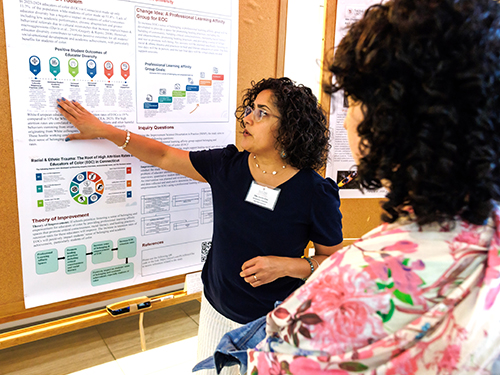Minor in Educational Studies
Inclement Weather: February 25, 2026
All classes starting prior to 11 a.m. will be remote. Classes after 11 a.m. will be in person. Non-essential staff should work remote until 11 a.m. then report to campus as scheduled.
In This Section
In This Section
SHU’s minor in educational studies program offers students, from the appropriate undergraduate majors, a smooth path to SHU’s graduate education teacher preparation programs.
The minor consists of electives designed to teach candidates the foundations of the education profession. These courses help students meet the teacher certification prerequisites in their undergraduate years and help reduce credit requirements in SHU’s graduate programs. Additionally, the minor provides students with experiences and opportunities to prepare them for classroom leadership.
Required Courses | 18 credits
Considers the application of psychological principles to educational theory and practice. Candidates explore the many ways of thinking about knowledge, teaching, and learning. Major theories of learning and development are introduced and consistent themes and concepts identified.
Focuses on identification of students with exceptional needs as well as methods of meeting their educational needs in general and special education classroom settings. Exceptionalities studied include all areas identified by national and state mandates.
Discusses current issues in American education, explores their historical and philosophical roots, and critically examines possibilities for the future of education.
An in-depth study of developmental and behavioral issues in adolescence. Emphasis is on adjustment to adolescent roles, the search for self-identity, and healthy and unhealthy personality development.
Prerequisite: Take PS 110
Choose Two | 6 credits
Choose six credits from the following
Based in the Gaeltacht region of West Kerry, the course compares the education system in Ireland with that of the United States. Topics addressed include curriculum and instruction, funding and governance, teacher preparation, multiculturalism, language policy, and contemporary school reform. Teacher candidates will be introduced to the students and teachers of Dingle, Ireland and experience the Irish education system up close and personal. Candidates will observe classrooms in action, learn from Irish teachers and administrators, and meet teacher candidates and their professors. Open to all students in FCEHD teacher education programs, the course counts in lieu of ED 304 Culturally Sustaining Education or it serves as an MAT elective.
This course examines children's language and literacy development from Pre-K to sixth grade. Candidates learn from an interdisciplinary body of scientifically-based research on literacy and issues related to reading and writing as well as sociocultural perspectives that shape literacy instruction. Evidence-based teaching approaches are introduced to support teacher candidates' foundational understanding of the development of word recognition, language comprehension, and writing. Candidates also learn about the role and language and culture on literacy learning with an emphasis on linguistic diversity and culturally and historically responsive instruction.
This course examines how media and technology relate to how we learn, communicate and create. Participants critically analyze the use of media and technology for teaching and learning in schools across a wide range of applications from creative digital tools, popular culture texts, and information sources, to assistive technologies, learning management systems, and generative AI. Participants expand and reflect upon their own use of media and technology for learning, communication, professional productivity, and teaching. Using key principles of the International Society for Technology in Education (ISTE) and the National Association for Media Literacy Education (NAMLE), participants design and deliver learning experiences using a variety of media and technology, to learn with and about. Participants consider legal, ethical and safety issues regarding media and technology use for teaching, learning and communication in schools and beyond. A laptop with Internet access is required.
Focuses on the current school and community responses to substance abuse, mental health needs, post pandemic effects, technology and social media challenges, identity issues, etc. Through classroom presentations, speakers, and audiovisual materials, students gain practical insight and understanding of contemporary issues in adolescent life.
Where Can You Go with a minor in Educational Studies
Minoring in Educational Studies paves the way for you to advance your career through combined programs and advanced degree pathways.
Related Links
More Information
The Latest in Farrington College of Education & Human Development
View More News-

How to Write a Thesis or Dissertation: 6 Steps that Lead to Success
AcademicsPublished:With proper planning, you can approach this academic milestone with confidence -

What Are the Best Master’s Degrees for Philosophy Majors?
AcademicsPublished:Turn your critical thinking into meaningful impact -

New Organizational Transformation Fellows Named
Academics, Advancing SHUPublished:Faculty and staff will collaborate on projects that advance workplace culture, professional growth and organizational change



